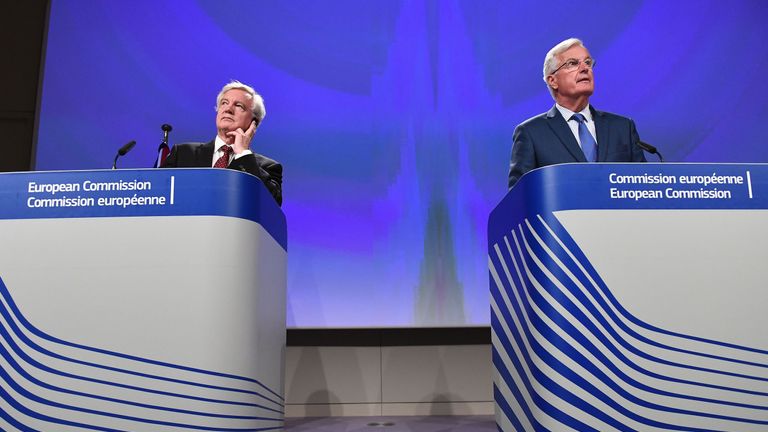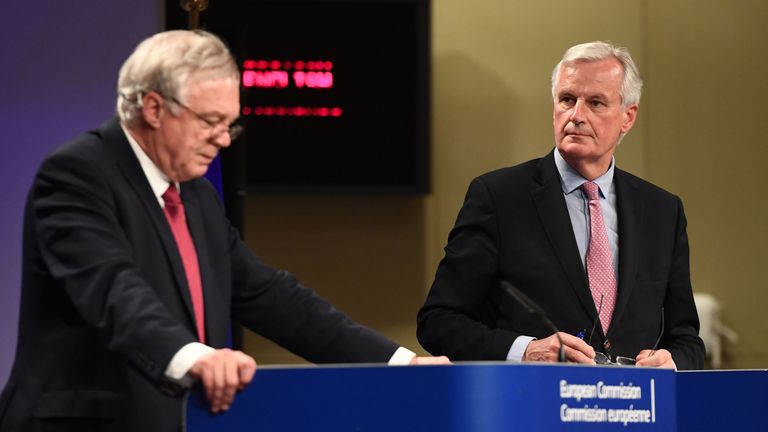Brexit talks: Tension, disagreement and frustration
Sharp exchanges between the EU and UK negotiators offer a glimpse into the talks, with the divorce bill emerging as a big hurdle.
Thursday 31 August 2017 18:03, UK
Extracting the UK from the European Union after more than 40 years was always going to be extremely complicated.
Today's news conference between the men leading the two sides' negotiating teams demonstrated just the beginning of those difficulties.
It felt like a window into the negotiations themselves; a brief glimpse at the tensions, disagreements and frustration.
Michel Barnier, the European Union's chief negotiator, appeared deeply frustrated, angry even.
He was, he explained, impatient, but not angry. We'd know, he said, when he was angry.
David Davis frowned plenty of times. He shook his head at a number of Mr Barnier's comments. And he took one sharp and direct swipe at him.
Mr Barnier had suggested that Mr Davis and his negotiators seemed almost nostalgic about the single market that they were determined to leave; they want all the benefits of the single market without being in it.
"I wouldn't confuse a belief in the free market with nostalgia," Mr Davis swiped back.
Mr Barnier said there had been on any of the key issues except Northern Ireland, where there had been some positive movement.
But on every other issue he talked in terms of "clarifications" by both sides, not progress.
"We did not get any decisive progress on any of the principal subjects even though the Ireland subject was fruitful," he said.
He added: "At this current state of progress we are quite far from being able to say sufficient progress is taking place."
"Sufficient progress" is the test by which the EU will determine if talks can move to talk about the future relationship.
He laid the blame for the lack of progress solely with the UK side.
"I am asked to show flexibility but you need to start with a clear position."
Mr Davis said that "actually" there had been more progress than Mr Barnier had acknowledged. "Some concrete progress," he said.
But the British side seems, understandably perhaps, to have downgraded the definition of "progress". It now seems simply to mean two sides have sat down, presented and understood each other's positions better.
On two of the three main separation issues - citizens' rights and the Irish border - the negotiations have clearly nudged in the right direction. Whether it can be classed as "progress" or "clarification" depends on who you ask. But expect further movement.
However on the third separation issue - the divorce bill or financial settlement, as it is more accurately described - there is proper deadlock.
This week the UK has used lawyers to punch holes through the financial demands the EU is making.
"We have a duty to our taxpayers to interrogate the bill rigorously," Mr Davis said.
Fair enough, the EU side might (but didn't) say.
What they did say in response is that the UK still has not provided their own assessment of what they think they owe. (Remember, the UK has now said, informally, that it will pay something).
Until the UK blinks and puts some maths on the table, it's hard to see how anything can move on.
But there is a larger overarching problem.
According to those close to the negotiations, the UK side is increasingly of the view that their counterparts on the EU side
It's certainly true that this is an unusual negotiation - one against 27 - and that the EU side must present progress updates back to the EU member governments.
Mr Barnier agrees that it is his mandate. But it's a mandate the UK agreed to.
He says the sooner Britain presents what he regards as real positions rather than just options, the sooner he can refer back to the 27 other nations and things can move forward.
Article 50 stipulates that the UK must leave the EU by March 2019. And so the longer this bickering on divorce issues takes, the shorter the time available for the UK to try to shape phase two: its transitional arrangements and future relationship.
Without agreement on phase two, the UK will fall out of the EU with no deal - it's a long time since we heard UK ministers utter the phrase "no deal is better than a bad deal", probably because they have realised it isn't.







